🎗️Lonny's War Update- October 687, 2023 - August 23, 2025 🎗️
🎗️Day 687 that 50 of our hostages are still in Hamas captivity🎗️
Relatives say PM condemning hostages by pushing offensive, ignoring deal on table
Hostages Forum lashes Netanyahu for refusing to consider offer, despite Hamas’s apparent acceptance of terms he previously okayed, and ‘torpedoing’ chances to save loved ones
Lishay Miran Lavi speaks at a press conference in Tel Aviv on August 21, 2025. (Avshalom Sassoni/Flash90)Relatives of Israeli hostages held in Gaza urged the government on Thursday to accept a proposed ceasefire deal that would free at least some of the hostages held in Gaza, fuming at Prime Minister Benjamin Netanyahu for appearing to ignore the Hamas terror group’s ostensible acceptance of terms he previously okayed.
With Netanyahu vowing to press ahead with plans to intensify fighting and conquer Gaza City, family members warned that leaving a deal to begin bringing home captives on the table and unanswered would condemn the 20 hostages still thought to be alive.
“We’re a step away from a total torpedoing” of the hostage agreement, Lishay Miran Lavi said at a press conference called by the Hostages and Missing Families Forum, which represents relatives of most of the hostages held in Gaza. Her husband Omri Miran has been held in Gaza for nearly two years.
Netanyahu has repeatedly claimed over the past 16 months to be “a step away” from the total defeat of Hamas. He repeated the contention in an interview broadcast on Australian television Thursday, saying Israel was “on the verge of completing this war,” and vowing to go through with plans to take over all of Gaza militarily — even if Hamas agrees to a ceasefire and hostage release deal.
Under intense international pressure, Hamas agreed earlier this week to a 60-day ceasefire that would reportedly free 10 living hostages, in line with an American proposal previously backed by Netanyahu’s government, and launch negotiations for the return of the rest of the hostages and an end to the war.
However, Netanyahu has in recent weeks shifted from supporting the partial agreement and instead now insists on a comprehensive deal rather than a partial, phased agreement. He has not convened his cabinet to discuss Hamas’s acceptance of the 60-day truce.
“Someone who has chosen for three days now not to respond to [Hamas’s acceptance of] an agreement the government already approved, not to convene the security cabinet or the [general] cabinet, has essentially chosen to sacrifice the hostages,” said Bar Goddard, daughter of Manny Goddard, who was killed on October 7 and whose body is one of at least 28 deceased hostages being held in Gaza.
An unnamed senior Israeli official told Hebrew media outlets on Wednesday that Israel does not currently plan to dispatch a team to Qatar or Egypt to take part in talks aimed at reaching a deal. Reports also suggested that Israel has, for the time being, decided to avoid responding at all to the phased deal approved on Monday by Hamas.
“There’s an agreement on the table that can save living hostages and bring deceased ones back for a proper burial,” Miran Lavi said. “Hamas has agreed, but the Prime Minister’s Office is working on torpedoing it, which will be a death sentence for the living hostages and condemn the deceased ones to remain lost.”
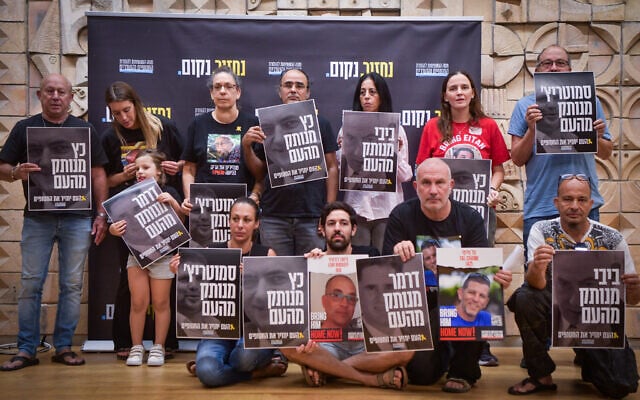 Families of Israelis held hostage in Gaza at a press conference in Tel Aviv on August 21, 2025. (Avshalom Sassoni/Flash90)
Families of Israelis held hostage in Gaza at a press conference in Tel Aviv on August 21, 2025. (Avshalom Sassoni/Flash90)Fifty hostages remain held captive in Gaza — 49 of the 251 taken hostage on October 7, and the body of a soldier who was killed in 2014. Israeli officials have declared that 28 of them are dead, while 20 are believed to be alive, and there are grave concerns for the well-being of two others.
In the first ceasefire deal in November 2023, 105 hostages were freed by Hamas, and another 30 were released in another deal in January-February 2025 alongside the bodies of eight slain hostages, which were returned to Israel. Five other hostages have been freed outside of these deals, while eight have been rescued by IDF troops, and the bodies of 49 captives have been recovered from Gaza throughout the war.
Channel 12 news reported on Monday that a senior member of Israel’s negotiation team told families that officials were seeking to leverage Hamas’s weakened position to reach a more comprehensive agreement, without giving up the possibility of securing the narrower deal Hamas has already accepted.
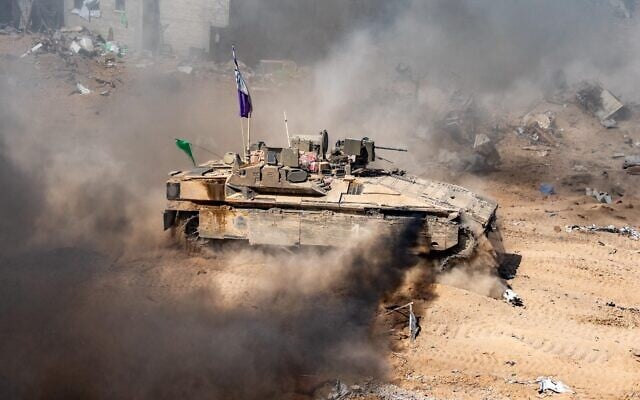 Israeli forces operate in the Gaza Strip, in a handout image published on August 20, 2025. (Israel Defense Forces)
Israeli forces operate in the Gaza Strip, in a handout image published on August 20, 2025. (Israel Defense Forces)The proposal to forge a partial hostage release deal, potentially leading to a final one, has garnered significant opposition from hard-right elements in Netanyahu’s coalition. However, opposition parties have promised to provide him with the necessary political cover to approve a deal.
Critics of Netanyahu, including the Hostages and Missing Families Forum, have accused him of making wartime decisions according to political considerations, a charge he forcefully denies, and of passing up past opportunities to reach a deal.
Netanyahu has in the past demanded that Israel reserve the right to resume fighting, while Hamas insists that it will only consider releasing all the hostages in exchange for a guaranteed end to the war. To bridge the divide, international mediators have focused on partial agreements meant to lead to a permanent settlement.
The terror group claimed this week that it had agreed to a deal based on a framework previously proposed by US Special Envoy to the Middle East Steve Witkoff, which would commit the terror group to release 10 living hostages and the bodies of 18 of the slain hostages, in exchange for a 60-day ceasefire and the release by Israel of hundreds of Palestinian security prisoners. The ceasefire deal would also include talks for a permanent end to the war.
“There’s a deal on the table. This is the opening we need for a comprehensive deal. We must sign it immediately,” Dalia Cusnir, whose brother-in-law Eitan Horn is among the hostages, said in English.
“We cannot support more fighting. We must make it clear: With this deal, negotiations must begin immediately for a comprehensive agreement that will bring them all back and end this war,” she added, calling on Witkoff and US President Donald Trump to put pressure on Jerusalem to agree to the deal.
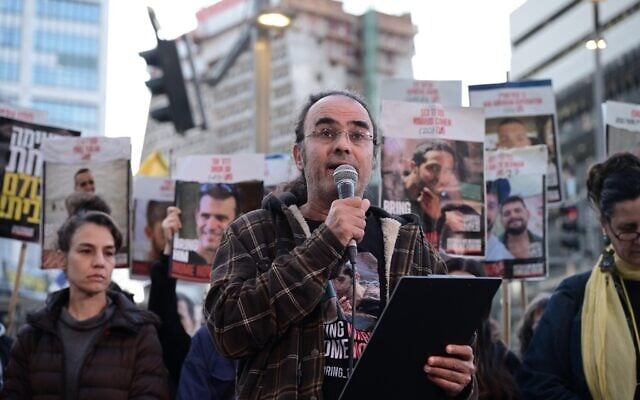 Yehuda Cohen, father of hostage soldier Nimrod Cohen, and other relatives of Israeli captives in Gaza hold a press conference in Tel Aviv on March 22, 2025. (Avshalom Sassoni/Flash90)
Yehuda Cohen, father of hostage soldier Nimrod Cohen, and other relatives of Israeli captives in Gaza hold a press conference in Tel Aviv on March 22, 2025. (Avshalom Sassoni/Flash90)Yehuda Cohen, the father of hostage Nimrod Cohen, voiced fears that an intensification of fighting would put hostages in harm’s way, noting that it was now the one-year anniversary since six hostages were executed by their captors as troops unknowingly closed in on their position.
He claimed that Israel Defense Forces soldiers had captured video footage in Gaza showing his son, vowing to fight for it to be published.
“Again, Netanyahu is presenting impossible conditions for a deal. This is of course to buy time and extend the war in order to serve the messianic extremists in the government,” he charged. “He plans to force the IDF to enter areas where they are being held alive… killing the rest of the living hostages.” link It is too clear for everyone that Netanyahu has all the time in the world to make decisions regarding the hostages, at least he feels he has all that time. He wants all the time in the world to secure himself for his political survival. The problem is that the hostages don't have all the time in the world. They are literally dying before our eyes, from the videos we have seen. We don't know the current situation of many of the estimated 20 living hostages and it is horribly possible that some have already died from their tortuous captivity. The world has seen the videos of Matan and Rom and we see that they look just like the survivors of the Nazi concentration camps. We have been moved to tears and anger that they are still there but the one person who can bring them home is not moved by any of the horrific scenes that he sees, their cries for redemption, the pain that their families are going through every second of every day and the pain of the nation that he supposedly leads and cares for. We can see that that the only part of the nation that he cares for is himself and his family and everyone else is just cannon fodder for his political survival. He is not moved by anything that would normally move someone with a heart and soul, but his heart and soul have been replaced by his insatiable narcissistic ego and need to always be prime minister, to be the "King Bibi" that he things he is. He is not. He is the king of destruction, of the country, of the citizens and of the Jewish people.
Biden official: Netanyahu sabotaged deals but calling him out would’ve helped Hamas
Matthew Miller tells Israeli TV show US wanted to declare publicly that Netanyahu was ‘completely intransigent,’ but saw Sinwar pull back from talks when detecting US-Israel strain
The Biden administration on several occasions wanted to publicly declare that Prime Minister Benjamin Netanyahu was hampering efforts to secure a Gaza ceasefire and hostage release agreement, but refrained from doing so upon understanding it would lead Hamas to harden its negotiating positions, a former senior US official revealed in an exposé that aired on Thursday.
“There were times that we very much wanted to go public and make clear that we thought the prime minister was being completely intransigent and making it tougher to get a deal,” former State Department spokesperson Matthew Miller, who was a close aide to former secretary of state Antony Blinken, told Channel 13’s “Hamakor” (“The Source”) TV program.
“But we discussed it amongst ourselves, and we made the decision that it wouldn’t accomplish anything [because] we had seen it in a number of cases, [former Hamas leader Yahya] Sinwar pulled back from negotiations when he thought there was division between the United States and Israel,” Miller continued. “We wanted to speak very toughly to the government of Israel behind closed doors, but ultimately not do anything that we thought would make it harder to get to a deal.”
Netanyahu has long been accused by critics within Israel and abroad of dragging out hostage negotiations since the early months of the war. But he has rejected those arguments by noting that US officials have repeatedly said publicly that Hamas was the main obstacle preventing deals from being reached.
Miller’s comments to Channel 13 offered some context for why that was the case, and the former Biden official recalled several instances when the US came close to calling out Netanyahu for allegedly torpedoing negotiations.
Entering Rafah ‘whether there’s a ceasefire or not’
One example cited by Miller came in April 2024 as Israel was threatening to invade the Gaza Strip’s southern city of Rafah, which Netanyahu at the time was characterizing as Hamas’s final stronghold in the enclave.
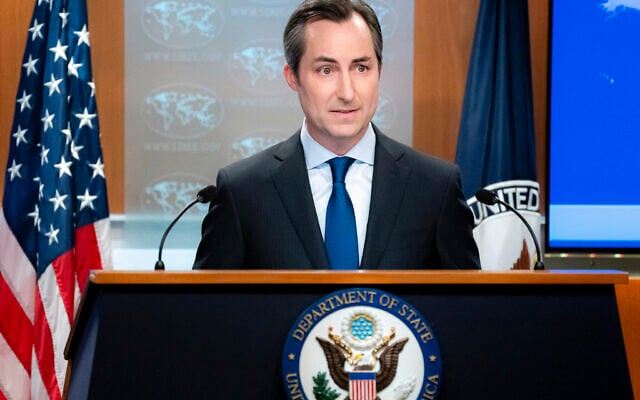 State Department spokesperson Matthew Miller answers questions during a news briefing at the State Department on July 18, 2023, in Washington. (AP/Nathan Howard)
State Department spokesperson Matthew Miller answers questions during a news briefing at the State Department on July 18, 2023, in Washington. (AP/Nathan Howard)Miller said the US had been pushing a six-week ceasefire and hostage release deal that still allowed Israel to resume the war afterward.
The former State Department spokesperson said the US was pressuring Hamas to accept the proposal, asserting that the terror group had good reason to comply, as doing so could potentially thwart Israel’s Rafah invasion, which Netanyahu had been delaying since February due to pressure from the administration not to launch the operation over Ramadan.
“But in the middle of that proposal being submitted to Hamas, the prime ministerpublicly said that Israel was going to invade Rafah, whether there was a ceasefire or not,” Miller said. “You can imagine how much harder that made it to get a deal over the line… [as it removed] the chief motivation [for Hamas] to agree to a deal.”
Trying to ‘box the prime minister in’
After months of authorizing what other Israeli hostage negotiators interviewed by “Hamakor” said was a very limited mandate, Netanyahu changed his approach completely in late May 2024, signing off on a proposal for the release of the remaining hostages in three phases that would culminate in an end to the war and a full Israeli withdrawal from Gaza.
Four days later, US President Joe Biden decided to give a speech revealing the key details of the proposal, fearing that Netanyahu would retreat from those terms.
“We told the government of Israel only an hour or two before the speech because, frankly, we spent the last few months seeing the government of Israel, at times, try and sabotage an approach to get to a ceasefire, and we were determined not to let that happen here,” Miller said, adding that the goal was to “box the prime minister in and made it very difficult for him to walk away from it.”
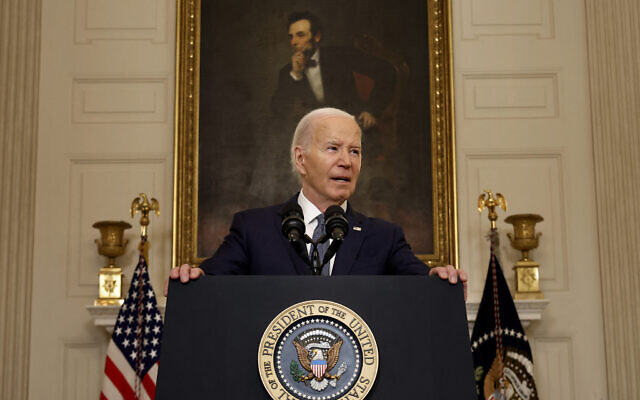 Then-US president Joe Biden announces a proposed truce-hostage deal between Israel and Hamas in Gaza at the White House’s State Dining Room in Washington, DC, May 31, 2024. (Chip Somodevilla/Getty Images/AFP)
Then-US president Joe Biden announces a proposed truce-hostage deal between Israel and Hamas in Gaza at the White House’s State Dining Room in Washington, DC, May 31, 2024. (Chip Somodevilla/Getty Images/AFP)But in the hours and days after Biden’s speech, Netanyahu’s office began leaking messages to reporters suggesting the proposal laid out by the president was not the same as what the prime minister had agreed to.
“It is consistent with the pattern we saw for many months. They were always looking for ways to add conditions or make the terms more difficult,” Miller said.
Philadelphi or bust
After more than a month, on July 2, Hamas came back with a response that the mediators and Israel’s negotiating team felt was close enough to Jerusalem’s position to secure an agreement.
Israel then took almost the entire month to respond to Hamas’s offer. “We got bogged down in other issues [and] the government of Israel came back with its insistence on keeping troops in the Philadelphi Corridor,” Miller said, referring to the Gaza-Egypt frontier.
Israel’s proposal from May didn’t include a demand to keep Israeli troops along the Philadelphi Corridor, and while Israel’s security establishment didn’t state that it was essential, Netanyahu began arguing in July that a withdrawal from the border could allow Hamas to smuggle weapons in from Egypt and even hostages out from Gaza.
“That maybe was the most frustrating of all, because we were so close to getting a deal that could have certainly brought hostages home and maybe ended the war once and for all,” Miller said.
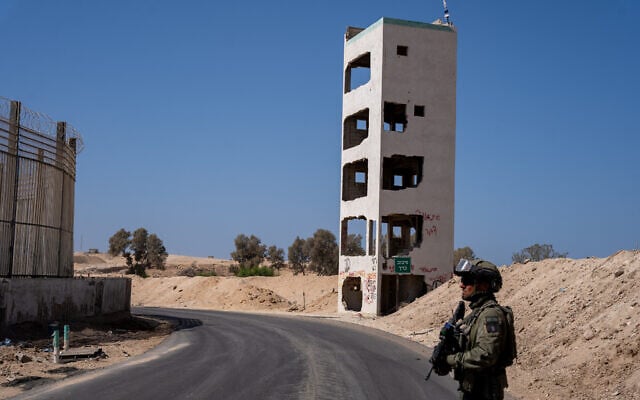 A soldier stands on the Philadelphi Corridor in southern Gaza’s Rafah, September 12, 2024. (Emanuel Fabian/Times of Israel)
A soldier stands on the Philadelphi Corridor in southern Gaza’s Rafah, September 12, 2024. (Emanuel Fabian/Times of Israel)Then-defense minister Yoav Gallant reportedly tried to persuade Netanyahu and the rest of the cabinet that the IDF could quickly retake the Philadelphi Corridor if needed, and that securing the release of the hostages who may not survive much longer was more essential, but he was overruled and the government voted in favor of a decision advanced by the premier for Israel to remain along the border.
“It [was] our best chance to get a deal. Hamas, for the first time, was feeling pressured to agree,” Miller said. “We were really close to a deal, and the prime minister added these new conditions.”
Undeterred, the US then presented a proposal in August 2024 aimed at bridging the differences between the sides. It allowed for Israel to remain in the Philadelphi Corridor for a longer period of time before it would be required to gradually withdraw. Netanyahu agreed to the proposal.
“But somehow it managed to leak that he told the families of hostages that Israel would never withdraw from Philadelphi, which, of course, was a complete contradiction of the position that he had taken,” Miller said.
“We spent… an enormous amount of time trying to get this ceasefire over the line, and when anyone said anything or did anything that made it more difficult, it was incredibly frustrating,” he added.
At the end of that month, as talks continued to drag on, Israeli soldiers unknowingly approached a tunnel where six hostages, including American-Israeli Hersh Goldberg Polin, were being held in Rafah. Their captors executed them and their bodies were uncovered by Israeli troops shortly thereafter.
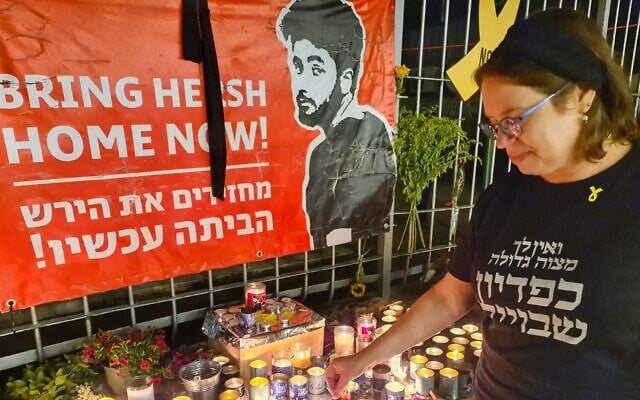 Shira Ben-Sasson, a founder of the Hakhel synagogue in Jerusalem, lights a candle in memory of congregant and slain hostage Hersh Goldberg-Polin, September 1, 2024. (Deborah Danan)
Shira Ben-Sasson, a founder of the Hakhel synagogue in Jerusalem, lights a candle in memory of congregant and slain hostage Hersh Goldberg-Polin, September 1, 2024. (Deborah Danan)“That was such a horrible day to read about what they had gone through. We had met with Hersh’s parents and heard from his mom about his bravery on October 7, and it never, never left me,” Miller said, tearing up, as he recalled how Hersh had lost his arm in a grenade attack in the roadside bomb shelter before being kidnapped.
“It was heartbreaking, both for the tragedy itself, but it also really hurt because we thought we could have had a deal earlier, and a deal that would have saved those hostages, and we weren’t able to get it.”
Finally getting a deal… that falls apart after first phase
By then, Israel had shifted its focus to neutralizing the threat from Hezbollah in Lebanon, and advanced hostage talks didn’t pick up again until December after the US brokered a ceasefire in the north.
White House Mideast czar Brett McGurk worked closely with then-incoming president Donald Trump’s special envoy Steve Witkoff to bring the deal over the finish line, with the latter leaning on Netanyahu to agree to the deal during a critical Jerusalem meeting on January 11.
Thirty-eight hostages — which included eight bodies — were released over the ensuing six weeks, during which Israel and Hamas were supposed to begin negotiating the terms of the permanent ceasefire that was supposed to come afterward.
But Netanyahu largely avoided holding those talks and ordered the resumption of fighting in March, which has continued to date.
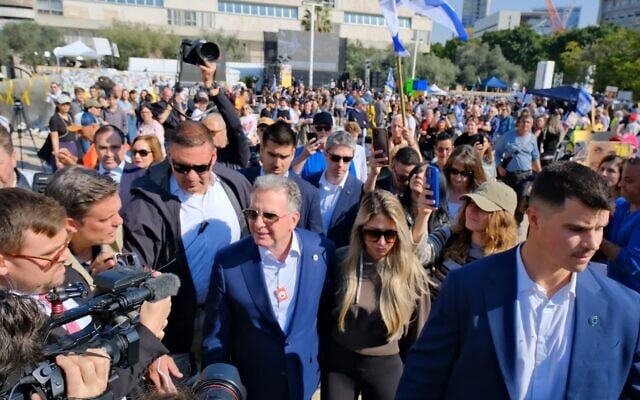 US envoy Steve Witkoff visits Hostages Square in Tel Aviv, to meet with the families of Hamas-held hostages, January 30, 2025 (Adar Eyal / Hostages Families Forum)
US envoy Steve Witkoff visits Hostages Square in Tel Aviv, to meet with the families of Hamas-held hostages, January 30, 2025 (Adar Eyal / Hostages Families Forum)By then, Trump was back in the White House, and Witkoff accepted Israel’s stated aversion to moving from the temporary truce phase of the deal into the permanent ceasefire phase. Instead, he pushed Hamas to accept a new proposal that again envisioned the sides agreeing to a temporary truce that could turn permanent if terms for ending the war were agreed upon.
“The Trump administration didn’t really pressure the government of Israel to stick to the terms of the agreement and let the prime minister resume the war without any serious effort at trying to bring it to an end,” Miller said.
McGurk, who also spoke with “Hamakor,” said he knew Israel would not be interested in phase two of the January deal after seeing the “grotesque” hostage release ceremonies that Hamas put on during the first phase, which were meant to show that the terror group was still the dominant force in the Strip.
‘Fighting for decades to come’
Asked whether he thought the US wanted a hostage deal more than Israel, Miller responded, “I believe that is true.”
“Did they always prioritize the hostage negotiation above everything else? Probably not,” McGurk told Hamakor.
“But was there a time in which we had a ‘yes’ from Hamas on a full hostage deal, and we presented it to Israel, and Israel then added additional conditions? That just didn’t happen,” he clarified.
 A handout picture released by the official Qatari news agency (QNA) shows Qatari Foreign Minister Mohammed bin Abdulrahman bin Jassim al-Thani (2nd-R) meeting with US National Security Council Coordinator for the Middle East and North Africa Brett McGurk (2nd-L) in Doha on November 19, 2023. (Photo by Qatar News Agency / AFP)
A handout picture released by the official Qatari news agency (QNA) shows Qatari Foreign Minister Mohammed bin Abdulrahman bin Jassim al-Thani (2nd-R) meeting with US National Security Council Coordinator for the Middle East and North Africa Brett McGurk (2nd-L) in Doha on November 19, 2023. (Photo by Qatar News Agency / AFP)“Hamakor” anchor Raviv Drucker maintained that Israel took steps to ensure that Hamas wouldn’t agree to a deal.
Gallant told Hamakor that he opposed any negotiations with Hamas in the immediate aftermath of October 7, as he felt Israel needed to respond strongly to the attack.
While Hamas may have been interested in a deal initially, he felt that the terror group would come back to the table begging for a ceasefire and still willing to release some of the hostages after Israel dealt a decisive blow to the terror group in the battlefield.
Moreover, there was a broader feeling among leadership, which Netanyahu has held to this day, that stopping the war would leave Hamas in power and able to regroup.
Druker pointed to a first instance in October 2023, when Hamas informed Qatari mediators that it was prepared to release hostages shortly after the terror group’s invasion of Israel, during which it massacred some 1,200 people and took 251 more hostage.
Miller said Qatar sought to reach Israel in order to discuss a potential hostage release deal, but Jerusalem wasn’t interested at the time, as the trauma of October 7 was still fresh and Israel was prioritizing hitting back against Hamas over returning the hostages.
In November 2023, after Hamas refused to release the remaining female hostages as required in the deal, Israel rejected the terror group’s offer to release elderly and wounded hostages and the ceasefire collapsed, former war cabinet minister Gadi Eisenkot told Hamakor.
Hamakor then revealed two more extended delays in negotiations from January to March of 2024, when Israel began insisting on remaining in the Netzarim Corridor that bisects northern and southern Gaza — a demand it eventually withdrew in the deal it accepted a year later.
Drucker then pointed to Hamakor’s revelations of two more delays in talks in April 2024, as Israel prepared to enter Rafah.
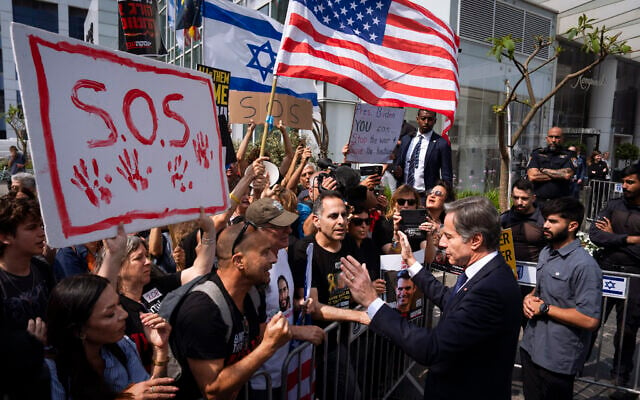 Then-US secretary of state Antony Blinken speaks to families and supporters of Israeli hostages held by Hamas in Gaza during a protest calling for their return, after meeting families of hostages in Tel Aviv, May 1, 2024. (AP Photo/Oded Balilty)
Then-US secretary of state Antony Blinken speaks to families and supporters of Israeli hostages held by Hamas in Gaza during a protest calling for their return, after meeting families of hostages in Tel Aviv, May 1, 2024. (AP Photo/Oded Balilty)He also recalled Israel’s added conditions regarding the Philadelphi Corridor in July 2024, which came before Hamas had given its final response, but still led talks to drag out significantly.
An additional Netanyahu-induced delay took place in early November 2024, when then-Shin Bet director Ronen Bar succeeded in crafting a breakthrough proposal that the prime minister told him to shelve in order to “wait for Trump,” Hamakor reported.
The broadcast ended with Miller recalling remarks Blinken made toward the beginning of the war as he sat in on an Israeli war cabinet meeting.
“The secretary was laying out all of our concerns to the prime minister and to the rest of the war cabinet. And he said, without a plan for the day after the conflict, you are going to be dealing with an insurgency in Gaza forever,” Miller said.
“You have continued instability in the West Bank. You are making it impossible to realize the dream that the State of Israel has had since its founding [normalization with Israel’s Arab neighbors]. You’re going to be bogged down here fighting this war for years and decades to come,” Miller added, recounting Blinken’s remarks.
“And the prime minister said, ‘You’re right. We are going to be fighting this war for decades to come. That’s the way it’s been. That’s the way it’s going to be,'” Miller recalled, apparently suggesting that the premier knew from the get-go that he was directing Israel toward an entrenched war in Gaza, and seemingly accepting it as a foregone conclusion.
Netanyahu’s office did not respond to the Hamakor report. link Now, a very senior Biden official speaks not anonymously about what we all know that everything that Netanyahu has done regarding the hostages and the war has been for his own political survival, that he holds most of the responsibility for all the negotiations for a deal that fell apart deliberately. This interview also details the ways he killed all the deals and is the basis for his completely overturning the negotiating team with his yes men to get rid of the people who wanted nothing more than to get the hostages home and actually were able to make the deals to do it. And finally, in the interview, Miller quotes Netanyahu saying "You’re right. We are going to be fighting this war for decades to come. That’s the way it’s been. That’s the way it’s going to be". This is what a coward says, not a leader. Netanyahu has said time and time again that we are destined to live by the sword. That is a load of crap that he has been selling for so long and unfortunately, using his typical scare tactics of existential survival against the enemies, he was able to find too many buyers of his 'living by the sword'. If we have learned anything by October 7, it's that what has been done by this prime minister for almost 2 decades is not working and never could work, yet he wants to stay in that same mode. As Einstein said “Insanity is doing the same thing over and over and expecting different results.” Netanyahu thinks that the Israeli public continues to be so fickle, so insane, as to believe that he can keep doing the same thing over and over again and be prime minister for life. That's not going to happen because we will not allow anyone to forget who brought us to October 7 and who has kept the hostages in captivity and dying for 687 days and counting. And we will not let him get away with anything. There will be a State Commission of Inquiry that will reach the truth of everything that transpired for years under Netanyahu's premierships and all of his mismanagement and criminal negligence regarding October 7 and the hostages and justice will be done, later than it should but it will all come out and he and others will pay the price.
Hostages’ families announce new nationwide disruption on Tuesday: 'Israel stands together'
Hostages’ Families Forum accuses Netanyahu of obstruction, vows another mass protest with nationwide solidarity events, a march, and a rally at Hostages Square, warning last Sunday’s disruption was 'only the beginning'
The families of Israelis held hostage in Gaza announced Friday that they will have another nationwide day of disruption on Tuesday—the 690th day since 51 hostages were taken—calling for mass participation and immediate action to bring them home.The plan includes solidarity events across the country, a march from Tel Aviv’s Savidor Central train station at 7 p.m., and a mass rally at Hostages Square at 8 p.m. with the demand: “Bring them all back now.”“They are about to torpedo the deal,” the family’s headquarters said. “On Tuesday, Israel stands together—leave your homes, show solidarity with the hostages. This is the order of the hour for every Israeli.”The announcement follows Sunday’s large-scale “Day of Disruption” organized by the October 7 Families Forum, which drew tens of thousands into the streets nationwide. After that protest, families had planned another day of action for the following Sunday, but canceled amid reports of a potential breakthrough in negotiations.“We are in the midst of another deliberate obstruction by Prime Minister Benjamin Netanyahu,” the families charged Friday. “Those kidnapped on his watch—who should have been the priority for rescue—were abandoned again, now sacrificed on the altar of political considerations. The government is disconnected from its people and is sacrificing its citizens. But 80% of Israelis stand with the hostages, and only the people will bring them home.”The families stressed that Sunday’s protest was “only the beginning.” They urged the public to join en masse on Tuesday in what they described as a massive civic day of solidarity under the banner “Israel Stands Together.”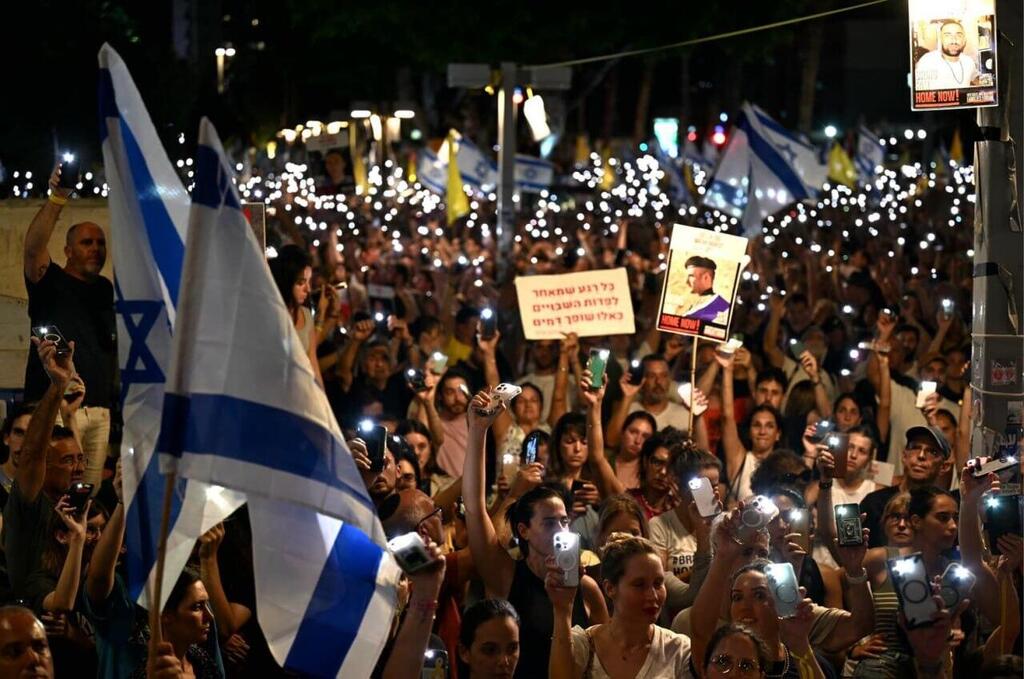 (Photo: Paulina Patimer)“Next Tuesday, Israel stands with the hostages, with the soldiers bearing the heavy burden, and with the tens of thousands of displaced families still waiting to return home safely,” the families said. “The people of Israel are proving that their values are saving lives and bringing loved ones home, restoring the living and giving the fallen a worthy burial in their land. That is the Israeli ethos—this is who we are.”Sunday’s protest brought tens of thousands of Israelis into the streets nationwide. Many organizations went on strike, while others allowed employees to join the demonstrations. Thousands gathered that evening at Hostages Square in Tel Aviv, where freed hostages and relatives of those still held spoke to the crowd.Among them was Anat Angrest, the mother of hostage Matan Angrest. “We are not a third-world country. We do not abandon our children on the battlefield,” she said. “From today, we will no longer say ‘someday.’ We will bring it on that day. We cannot remain silent anymore. Silence is killing the hostages and the soldiers sent into battle. Today was only the beginning. There will be no more cruel ‘hostage routine.’” Link
(Photo: Paulina Patimer)“Next Tuesday, Israel stands with the hostages, with the soldiers bearing the heavy burden, and with the tens of thousands of displaced families still waiting to return home safely,” the families said. “The people of Israel are proving that their values are saving lives and bringing loved ones home, restoring the living and giving the fallen a worthy burial in their land. That is the Israeli ethos—this is who we are.”Sunday’s protest brought tens of thousands of Israelis into the streets nationwide. Many organizations went on strike, while others allowed employees to join the demonstrations. Thousands gathered that evening at Hostages Square in Tel Aviv, where freed hostages and relatives of those still held spoke to the crowd.Among them was Anat Angrest, the mother of hostage Matan Angrest. “We are not a third-world country. We do not abandon our children on the battlefield,” she said. “From today, we will no longer say ‘someday.’ We will bring it on that day. We cannot remain silent anymore. Silence is killing the hostages and the soldiers sent into battle. Today was only the beginning. There will be no more cruel ‘hostage routine.’” LinkTrump suggests fewer than 20 hostages remain alive; families demand new information
‘The 20 is actually probably not 20 because a couple of them are not around any longer,’ US president says, as Israeli hostage envoy insists ‘no change’ in figures
US President Donald Trump said during a press conference in the Oval Office on Friday that fewer than 20 hostages held by terror groups in Gaza are still alive, sparking despair from the families of the captives and a denial from Israel’s hostage point man.
Speaking to reporters in the White House, Trump took credit for the release of hostages during the last ceasefire deal, decried Hamas’s “extortion,” and spoke about efforts to bring the final group of captives back home.
“So now they have 20,” he said, “but the 20 is actually probably not 20 because a couple of them are not around any longer.”
In his statement, the president did not elaborate on his assertion that fewer than 20 hostages are alive, and insisted that “We’re doing everything we can to get the hostages out, it’s not easy.”
“The situation has to end, it’s extortion and it has to end,” he said, referencing Hamas’s hostage taking and negotiations, and added that he thinks it would be “safer, in many ways,” to free the hostages militarily, instead of through a deal with Hamas.
In the Oval Office, Trump was also asked why the US appears to be backing the Israeli decision to take over Gaza City when the hostage families are opposed and worry that it will condemn their loved ones to death.
“Not all of them,” Trump replied.
“And you have to understand, I’m the one who got all of the hostages out,” he said, taking credit for the release of “hundreds” of hostages, though fewer than 150 captives remained in Gaza when he took office on January 20.
After the president’s comments to the press, the Hostages and Missing Families Forum released a statement reading: “Mr. President, there are 50 hostages. For us, each and every one of them is a world in itself.”
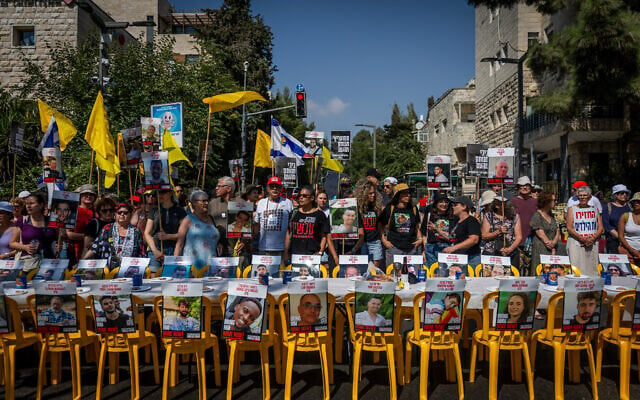 Hostage families stage a protest outside the Jerusalem residence of Prime Minister Benjamin Netanyahu, August 22, 2025.
Hostage families stage a protest outside the Jerusalem residence of Prime Minister Benjamin Netanyahu, August 22, 2025.
(Yonatan Sindel/Flash90)“If [Strategic Affairs Minister Ron] Dermer, who only talks to the Americans and doesn’t bother to talk to or meet with the families of the hostages, knows something different, he should have informed the families first,” the families said.
Gal Hirsch, the government’s point man on the hostages, issued a statement following the remarks: “According to the information we have, there is no change in the number of living hostages.”
“Twenty of the hostages are alive, two are in grave danger for their lives, 28 are no longer alive and have been declared deceased,” Hirsch wrote to the families.
Israel has long stated that terror groups in the Gaza Strip are holding 50 hostages, including 49 of the 251 abducted by Hamas-led terrorists on October 7, 2023. They include the bodies of at least 28 confirmed dead by the IDF. Twenty are believed to be alive, and there are grave concerns for the well-being of two others, Israeli officials have said. Hamas is also holding the body of an IDF soldier killed in Gaza in 2014.
Trump’s comments came as Israel prepares to launch a large-scale operation to conquer Gaza City and amid a flurry of international efforts to bring the sides back to the negotiation table to forestall the operation.
Israel is expected to launch its new offensive on Gaza City in mid-September, some two weeks after newly called-up reservists are set to report for duty on September 2, Channel 12 reported on Friday.
Some one million Palestinians currently in Gaza City will be called upon to evacuate as soon as Sunday, the network said.
According to the report, Prime Minister Benjamin Netanyahu and the political echelon are pushing to speed up the launch of the operation, while the military wants to first take steps to safeguard the hostages and the troops, and also evacuate the Palestinians from Gaza City and ensure there is international legitimacy for the operation.
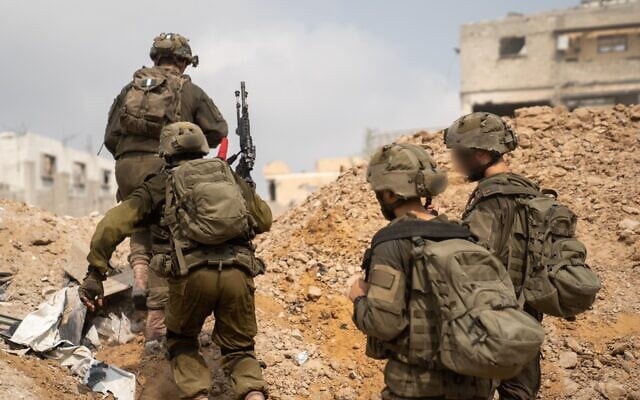 IDF troops operate in the Gaza Strip, in images published on August 22, 2025. (Israel Defense Forces)
IDF troops operate in the Gaza Strip, in images published on August 22, 2025. (Israel Defense Forces)The network cited Israeli officials as saying it is urgent to get out the hostages as soon as possible due to their dire condition. Sources cited by the outlet added that there are currently no substantive disagreements between Israel and Hamas on a ceasefire-hostage deal, but “it all depends on Netanyahu.”
“There are no magic solutions,” the sources were quoted as saying. “If [we] want to bring back the hostages [we] can do that now.”
The terror group recently said it accepted a partial hostage deal that Israel had agreed to in the past, while Netanyahu has vowed to push on in Gaza City and to negotiate only for a deal that would release all the hostages. A source cited by Channel 12 said a partial deal was never on the table, and that Israel has only sought a comprehensive deal in two phases.
Despite the apparent impasse in the ceasefire talks, Israel is expected to send negotiators to renewed ceasefire-hostage talks in the coming days, Channel 12 reported, adding that talks have already begun on setting the time and place for the negotiations, which have stalled since Israel and the US recalled their negotiators from Doha last month.
The network added that it is unclear where the renewed talks will take place, and that they will commence in a location other than Doha or Cairo, where they have taken place until now
Israel reportedly assesses that the impending operation in Gaza City is placing great pressure on Hamas, possibly leading to greater flexibility in the talks.
According to the network, Netanyahu seeks to drive that point home by renaming the operation “Iron Fist,” rather than the name “Gideon’s Chariots 2” that has been used until now, following the original Operation Gideon’s Chariots that was launched in May.
Sources present in Netanyahu’s consultations say he has been using the name Operation Iron Fist over the past couple of days, Channel 12 reported.
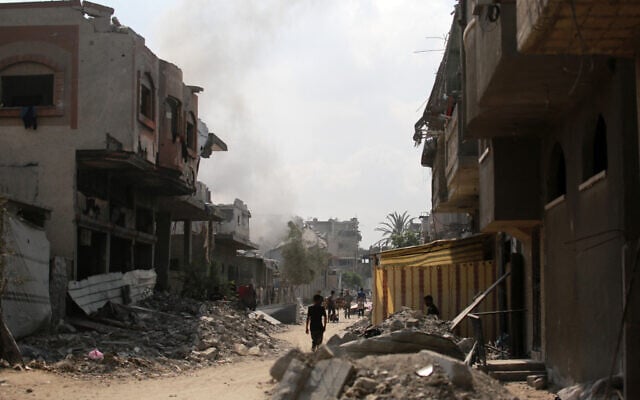 Smoke rises following an Israeli strike in the Abu Iskandar neighborhood of northern Gaza City on August 22, 2025. (Bashar TALEB / AFP)
Smoke rises following an Israeli strike in the Abu Iskandar neighborhood of northern Gaza City on August 22, 2025. (Bashar TALEB / AFP)Israel, which has called up tens of thousands of army reservists, is pressing ahead with its plan to seize Gaza’s biggest urban center despite international criticism of an operation likely to force the displacement of many more Palestinians, and despite concerns by top security officials that it could endanger the hostages.
The Hamas-run Gaza health ministry says more than 62,000 people in the Strip have been killed or are presumed dead in the fighting so far, though the toll cannot be verified and does not differentiate between civilians and fighters. Link Trump and Netanyahu share a lot of things and also have certain differences. Some of the shared qualities are that neither of them have the genes for empathy or sympathy. While Netanyahu still retains some tact, Trump has none. Trump’s motives for ending the war and getting the hostages home are selfish; he wants to be awarded the Nobel Peace Prize (which is fine with me and everyone else if he does indeed bring them home). Netanyahu’s motives in regard for the hostages are also selfish and for his political survival selfishness, he has been willing to sacrifice all of the hostages.
And both of them say many things without understanding or caring about the impact of their words in the hostage families. They can be heartless and as painful as stabbing multiple knives into all of their hearts. And that’s what Trump’s statement about the amount of living hostages did in the exact way that Netanyahu’s wife did while sitting next to him addressing some hostage families, and then Netanyahu confirmed his evil wife’s statement. They don’t feel bad about what they say and they certainly don’t care about the pain they cause.
Another character flaw they both share is callousness. Trump cannot understand why the hostage families care about the return of the dead hostages. As far as he is concerned, they're dead and it doesn't matter what happens to them. Apparently, Netanyahu also shares this feeling as he has talked many times only about the living hostages and only after the outrage of the Hostage Families does his office 'make a clarification' that he meant all of the hostages.And then, the pain is deepened when the very person who is supposed to be doing everything possible, Dermer refuses to talk to them and has always been the most vocal in Netanyahu’s ear not to make any deals. In the 6 months since he was appointed to be in charge of negotiating, he hasn’t succeeded in bringing a single hostage home. The only way that he could be called a success is if his orders were to allow all of the hostages to rot and die as long as his boss stays in power. For all we know, those might have been the instructions he was given because between the two of them, Netanyahu and Dermer, the blood of so many hostages is directly in their hands. I can only hope that they will pay a price for their negligence and destruction.
Poll: 62% of Israelis believe government has lost public’s confidence, majority back some form of hostage deal
A poll by the Maariv daily shows 62 percent of the public believes the current government has lost the confidence of the majority of the population.
The survey asked respondents, “Without regard to how you voted in the last election, do you believe the government has the confidence of the nation now?”
Only 27% respondents answer that the government has the confidence of the majority of the population, and 11% answer that they didn’t know.
Measuring support for a hostage deal, the survey finds that 26% of respondents believe that the government needs to sign a deal immediately, even if it only brings back some of the hostages, due to their deteriorating state in captivity.
Forty-six percent answer that the government should sign a comprehensive deal that ends the war in Gaza, while 18% oppose a deal, believing that the military should continue fighting Hamas even at the risk to the lives of the hostages.
Ten percent did not know what to answer.
The poll was carried out by Dr. Menachem Lazar and Panel4All between August 20 and 21, with 509 respondents, and has a 4.4% margin of error.
Hostage’s dad voices support for partial deal: ‘Anyone who can be saved must be saved’
The father of hostage Alon Ohel expresses support for a ceasefire deal that would not return all those held by Palestinian terrorists in Gaza at once, saying that “anyone who can be saved must be saved.”
Speaking at a cultural event in the south, Kobi Ohel says the hostages who are still alive “don’t have time and therefore we must do everything possible to reach a deal like this that frees everyone, even if it’s in stages.”
Ohel adds that he backs the current 60-day truce proposal agreed to by Hamas that would see the release of 10 living hostages.
**There is nothing more important than getting them home! NOTHING!**
“I’ve never met them,But I miss them. I’ve never met them,but I think of them every second. I’ve never met them,but they are my family. BRING THEM HOME NOW!!!”
There is no victory until all of the hostages are home!אין נצחון עד שכל החטופים בבית
Red Alerts - Missile, Rocket, Drone (UAV - unmanned aerial vehicles), and Terror Attacks and Death Announcements
*4:15pm yesterday-Gaza envelope- drone intrusion from Houthis in Yemen -Bnei Netzarim, Dekel, Talmei Yosef, Naveh
*8:55pm yesterday - Ballistic missile from Yemen - Gush Dan, Jerusalem areas, Shfela, West Bank, Lachish, Sharon areas - successfully intercepted - A house on a moshav Ginaton near Lod was hit but no reports of injuries
Houthi missile strikes 85-year-old woman's home: 'There was a huge boom, everything exploded'
Ilana Hatoumi unharmed by shrapnel; IDF says a preliminary review suggested the missile broke apart in the air; air defense systems attempted several interceptions
“I was sitting in the shelter, I heard a boom, everything exploded — and that’s it,” Hatoumi told Ynetnews. “The windows shattered. We’re fine, I’m healthy. Nothing happened, everything can be fixed. It’s only property damage.”
Her daughter, Shira, said the family was fortunate Hatoumi heard the siren and went into the safe room. “The whole house shook and everything shattered. Thank God she’s fine, a bit shaken but fine. She’s a strong woman,” she said.
The IDF said a preliminary review suggested the missile broke apart in the air. Air defense systems attempted several interceptions. Departures and landings at Ben Gurion Airport were briefly halted.A senior Houthi official, Nasser al-Din Amer, claimed the missile split into multiple warheads.Police said bomb disposal experts were working at the scene and urged residents to stay away from areas where fragments fell.“It’s a great miracle there were no casualties and that she followed the guidelines,” said Assaf Iluz, security chief of the Hevel Modi'in Regional Council.
Palestinian reports say 34 killed in Israeli attacks across Gaza since dawn
Palestinian media reports citing medical officials say 34 people have been killed in Israeli attacks in the Gaza Strip since dawn today.
The toll is not independently verified and does not differentiate between combatants and civilians.
According to the reports, six of the people were killed while waiting for aid in the northern Gaza Strip, two were killed in a drone strike on a tent in Khan Younis, and one was killed in a drone strike on a house in al-Sabra, south of Gaza City.
The IDF has yet to comment on reported strikes today.
Palestinians begin repairing European Hospital ahead of Gaza City evacuation
Palestinians have begun to clean up and renovate the European Hospital in southern Gaza’s Khan Younis, as part of preparations for the evacuation of Gaza City.
Earlier this week, the IDF said that the European Hospital, which was closed after the military raided and sealed a Hamas tunnel running underneath it, was slated to resume operations.
A security official said the UN and international aid groups were formulating a plan to restart the hospital “as an additional medical response” for the estimated one million Palestinians who are set to be displaced from Gaza City when the IDF launches its offensive there. The military also warned medical officials in northern Gaza to prepare to move their equipment to hospitals in the Strip’s south.
Footage published by Palestinian media yesterday shows medical staff cleaning up the hospital, as well as an excavator at work in the compound, after the IDF allowed them to enter the area.
On May 13, Hamas leader in Gaza, Mohammed Sinwar, and other top commanders in the terror group were killed in an airstrike on a tunnel running underneath the hospital. The military raided the medical facility in June, capturing their bodies and sealing the tunnel underneath it with concrete.
Hezbollah weapons depot in south Lebanon targeted in Israeli strike, IDF says
A Hezbollah weapon depot in southern Lebanon’s Deir Kifa was targeted in an Israeli strike a short while ago, the IDF says. The military says the site was a violation of the ceasefire between Israel and Lebanon.
The strike comes several hours after the Israel Defense Forces said it killed a Hezbollah operative in a drone strike on Ayta ash-Shab.
Israel is planning to conquer Gaza City – what legal obligations will that incur?
Displacing the estimated one million residents of Gaza City will heighten Israel’s responsibility to ensure a humanitarian catastrophe is avoided, say legal experts
The government and the Israel Defense Forces are currently moving resolutely ahead with plans to conquer Gaza City, with the military having begun the process of calling up 60,000 reservists to participate in or support the new offensive.
As part of the operation, dubbed Gideon’s Chariots B, the IDF intends to evacuate Gaza City of its estimated one million residents and relocate them south of the Netzarim Corridor, between the southern Gazan cities of Khan Younis and Rafah.
Such a complex operation, both to conquer Gaza City and to move such a massive population, will inevitably raise questions about Israel’s legal obligations toward Gaza’s civilian population and the legality of the operation itself.
Belligerent Occupation
Under the laws of armed conflict, states may occupy foreign territory in the context of armed conflict, and indeed, it is a common phenomenon of war.
Dr. Eran Shamir Borer, director of the Israel Democracy Institute’s Center for Security and Democracy and former head of the IDF international law division, notes that an occupation is considered in effect if a territory comes under the “effective control” of a hostile force.
“Effective control,” he explains, means having “boots on the ground” in terms of troops being present in the territory in question, while at the same time, the hostile power must be able to exercise governance over the territory, and the previous government must no longer have that capability.
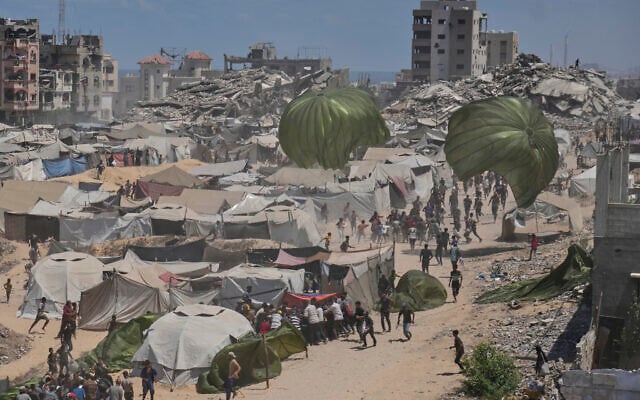 Palestinians rush to collect humanitarian aid airdropped by parachutes into Gaza City, northern Gaza Strip, August 7, 2025. (AP/Jehad Alshrafi)
Palestinians rush to collect humanitarian aid airdropped by parachutes into Gaza City, northern Gaza Strip, August 7, 2025. (AP/Jehad Alshrafi)In March this year, the High Court of Justice ruled that Israel was not an occupying power in Gaza at the time, since it did not have the ability to govern the Strip and because Hamas was still able to exercise its own rule over the Gazan population.
Today, Israel is in control of some 75 percent of Gaza’s territory, but at present, most of the territory it holds includes almost no Palestinian civilians. Most civilians are instead concentrated in the Muwasi humanitarian zone in the south, in Gaza City in the north and the Deir al-Balah governorate in the center.
Shamir Borer says that even today, Israel could argue it is not in occupation of those areas where Gazans are currently present, since Hamas still exercises effective governmental control over the population centers, and controls aspects of civilian life there.
He noted, however, that other legal arguments hold that since Israel controls so much of Gaza’s territory, as well as all entry and exit points to and from the Strip, Israel is in effect already an occupying power in Gaza. This has been the position of states such as the UK.
The cabinet resolution of August 7 seems to instruct the IDF to establish “operational control” over Gaza City, rather than to occupy it, perhaps in an attempt to avoid acknowledging Israel’s legal responsibilities that come with the status of an occupying power.
Writing for the legal blog Just Security, Prof. Eliav Lieblich of Tel Aviv University’s Faculty of Law said of the cabinet resolution to occupy all of Gaza that “claiming that one can ‘take over’ territory – or achieve ‘operational control’ over it – without occupying it, is nonsense.”
He also noted that Netanyahu has repeatedly stated that part of the planned operation is to remove Hamas from power, but pointed out that in so doing, Israel would in effect be fulfilling the conditions of a belligerent occupation.
Legal obligations of occupation
The issue of whether an occupation has been established in a legal sense is critical, because if a state is considered to be occupying a territory, its legal responsibilities to the civilian population under its control are much greater than its obligations to that population simply as a warring party.
In an occupation, the occupying power has a legal duty to provide for the civilian population under its control and ensure security and public order.
For Israel in its current war, this would include in the immediate term being legally responsible for providing food, water, shelter, medical services, and other critical needs of the Gazan civilian population, including from its own resources if necessary.
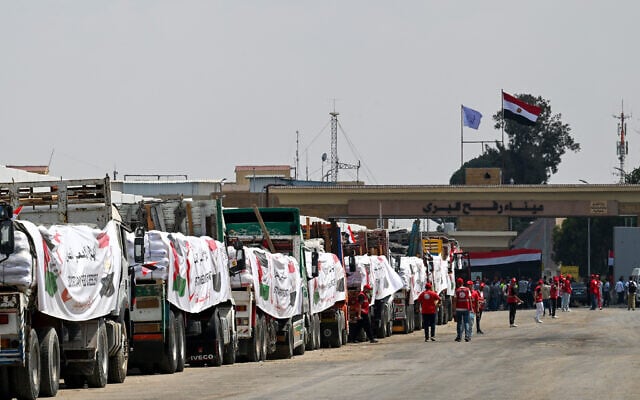 People walk past trucks loaded with aid for Gaza waiting on the Egyptian side of the Rafah crossing on August 18, 2025. (Khaled Desouki / AFP)
People walk past trucks loaded with aid for Gaza waiting on the Egyptian side of the Rafah crossing on August 18, 2025. (Khaled Desouki / AFP)In the longer term this would include fulfilling all responsibilities of national and municipal authorities, from education and sanitation to economy and trade regulation.
That compares to the legal obligations under the laws of armed conflict when there is no belligerent occupation, when a warring party is only obligated to “allow and facilitate“ the provision of food and medical supplies by third parties to a civilian population, subject to certain conditions aimed at preventing enemy forces from taking advantage of such aid, and does not hold ultimate responsibility for its supply.
Under the Fourth Geneva Convention, to which Israel is signatory, free passage of all medical supplies must be allowed into territory under its control, although the treaty states that the facilitation of food is only obligatory for children under 15, expectant mothers and “maternity cases.”
But Article 70 of the Additional Protocol I of the convention, to which Israel is not a party, is broadly seen as requiring the provision of food to all civilians.
Shamir Borer points out that although Israel is not a signatory to Additional Protocol I, it has, in court proceedings, indicated that it regards the core aspect of Article 70 as reflecting International Customary Law, a body of law arising from “general practice accepted as law” and norms of international law.
Israeli military officials and cabinet ministers have been careful not to describe the pending operation against Gaza City as a plan to “occupy” it, using instead the phrase “take control,” likely due to the legal consequences of a formal occupation.
Attorney General Gali Baharav-Miara pointed out this issue when the cabinet took the decision on August 8 to conquer the entire Gaza Strip, telling Netanyahu that this would make Israel responsible for the needs of the entire territory. The prime minister, in response, told the attorney general the intention was to merely “take control” of the territory, not “occupy” it.
Lieblich, in his article, alleged that Netanyahu’s use of the term “take control” is designed specifically to establish “an occupation of the maximum possible territory with the minimum possible civilians.”
But the absence of civilians from the territory Israel takes control of would be a result of Israel’s actions in order to claim that there is no occupation to begin with,” he asserted.
“While this is a non-starter legally, it is part of a wider political discourse of denying any responsibility for the welfare of Gaza’s civilians,” wrote Lieblich.
Legal consequences of evacuating civilians
Israel intends to evacuate Gaza City’s civilian population to areas where it does not seek to establish effective control, which would help reduce civilian casualties during the subsequent offensive there, and would also bolster claims it is not occupying the civilian population and therefore does not bear the broader legal responsibilities arising from the law of occupation.
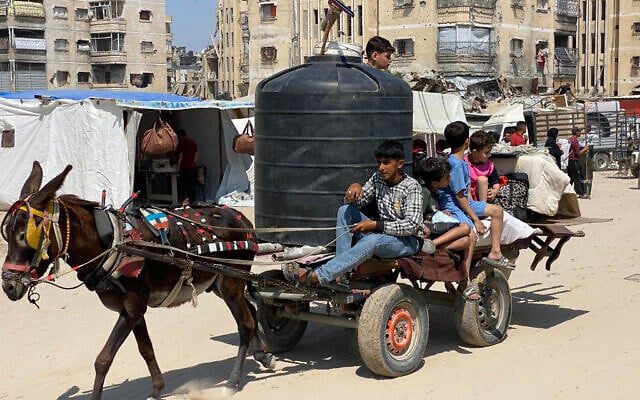 Boys sit next to a cistern in the back of a donkey-drawn cart as they leave Khan Yunis in the southern Gaza Strip on June 3, 2025 following an evacuation order the previous day. (AFP)
Boys sit next to a cistern in the back of a donkey-drawn cart as they leave Khan Yunis in the southern Gaza Strip on June 3, 2025 following an evacuation order the previous day. (AFP)But there would nevertheless exist a legal obligation for Israel not to create a situation of dire humanitarian conditions in which some one million people evacuated from Gaza city are left without adequate provisions for food, shelter and medicine, Shamir-Borer said.
“There is an obligation to facilitate the provision of aid. if you’re moving [Gazans] somewhere where they can’t get aid, then you may be violating those laws,” he asserted.
“Israel would be exposing itself to accusations already out there that it is deliberately creating dire humanitarian conditions.”
These accusations have taken on additional weight in light of comments by senior Israeli cabinet ministers in recent months of an intention to create difficult humanitarian conditions to compel Gazans to emigrate.
Doing so would likely constitute forced displacement.
In May this year, leader of the far-right Religious Zionism party and Finance Minister Bezalel Smotrich said that it was the government’s intention to “concentrate” the Gazan population in the south of the Strip where they would be confined to a “humanitarian” zone.
“They will be totally despairing, understanding that there is no hope and nothing to look for in Gaza, and will be looking for relocation to begin a new life in other places,” Smotrich said at the time.
Prime Minister Benjamin Netanyahu has reportedly made similar comments regarding the destruction of Gaza’s housing stock by the IDF during operations, saying in a closed door session of the Knesset Foreign Affairs and Defense Committee — according to media reports — “We are destroying more and more houses, they [Gazans] don’t have anywhere to return to,” and adding, “The only expected result will be a desire for Gazans to emigrate outside the Strip.”
Publicly, at least, Netanyahu has said that moving the population to the south will be carried out for the safety and protection of Gazan civilians, which the Fourth Geneva Convention permits.
Avoidance measures
It appears that Israel is making some effort to avoid a situation in which it deepens the humanitarian crisis in Gaza if and when it evacuates Gaza City’s civilian population.
The provision of tents and shelter equipment to Gaza was renewed at the beginning of this week, “as part of the IDF’s preparations to move the population from combat zones to the southern Gaza Strip for their protection.”
Such items have not been allowed into the Strip for the last 26 weeks,
And Israeli liaisons to Gaza began telling medical officials and aid groups in the northern part of the Strip this week “to prepare for the population’s movement to the southern Gaza Strip,” including transferring medical equipment to that region.
The provision of aid to Gaza has also been ramped up in the last two months, although it remains well below the levels of aid allowed in during 2024, with the UN and aid agencies insisting that the humanitarian situation in the territory remains dire.
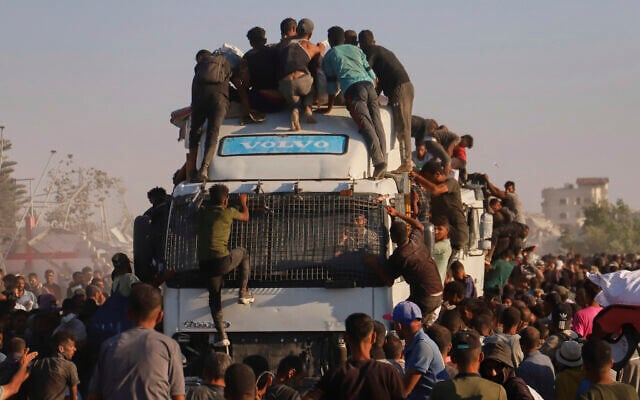 Palestinians ride on a truck loaded with food and humanitarian aid as it moves along the Morag corridor near Rafah, in the southern Gaza Strip, August 4, 2025. (AP/ Mariam Dagga)
Palestinians ride on a truck loaded with food and humanitarian aid as it moves along the Morag corridor near Rafah, in the southern Gaza Strip, August 4, 2025. (AP/ Mariam Dagga)The UN Office for the Coordination of Humanitarian Affairs said on Wednesday that to cope with the current shelter needs of the Gazan population would require the entry of some 3,500 truckloads of tents, tarpaulins and basic household items, without factoring in further displacement from Gaza City.
OCHA also said that the plan to conquer Gaza City “will have a horrific humanitarian impact on people already exhausted, malnourished, bereaved, displaced, and deprived of basics needed for survival.”
It warned the operation was “a recipe for further disaster,” and said it could also amount to “forcible transfer.”
Israel’s Coordinator of Government Activities in the Territories (COGAT) has pushed back against these claims, publishing on Thursday images and videos of food being prepared and distributed in Gaza.
COGAT head Maj. Gen. Ghassan Alian accused the UN on Thursday of making “unfounded claims about hunger in Gaza,” and said Israel was working to “facilitate the entry of massive quantities of food, medicine, and humanitarian aid.”
“Instead of issuing statements and publishing political and distorted reports, the UN and international organizations should direct their efforts toward real assistance for the residents, and not be dragged into false narratives that serve terrorism,” said Alian. Link
- The Region and the World
UAE denounces Israel for approving E1 settlement project
The United Arab Emirates condemns Israel for approving the controversial E1 settlement project outside Jerusalem.
An Emirati foreign ministry statement says the move “constitutes grave violations of international law and relevant United Nations resolutions, severely undermining regional and international efforts to achieve a just and comprehensive peace and establish an independent Palestinian state.”
It also warns of “catastrophic consequences of continued aggression, including the escalating humanitarian suffering and the threat posed to regional security and stability.”
- Personal Stories
- First female IDF commando doctor reveals life-saving work on Gaza and Lebanon fronts
- Maj. Dr. R., the first female medical officer of the IDF Commando Brigade and a Medal of Excellence recipient, reflects on 20 months of war—treating comrades under fire, surviving a drone strike and the emotional toll of saving lives in combat
A week before October 7, Maj. Dr. R. began her post as the chief medical officer of the IDF Commando Brigade. Since then, she has served on every front of the war. She hardly survived a drone explosion, identified a fallen comrade from her command post in Gaza, coordinated the evacuation in one of the war’s toughest incidents involving the Egoz unit, and received a video from a wounded soldier whose life she helped save. Now, she speaks about the emotional toll: “We know how to care for everyone else. Caring for ourselves is the hardest."
Acronyms and Glossary
ICC - International Criminal Court in the Hague
IJC - International Court of Justice in the Hague
MDA - Magen David Adom - Israel Ambulance Corp
PA - Palestinian Authority - President Mahmud Abbas, aka Abu Mazen
PMO- Prime Minister's Office
UAV - Unmanned Aerial vehicle, Drone. Could be used for surveillance and reconnaissance, or be weaponized with missiles or contain explosives for 'suicide' explosion mission
Join my Whatsapp update group https://chat.whatsapp.com/IQ3OtwE6ydxBeBAxWNziB0
Twitter - @LonnyB58 Bluesky - @lonny-b.bsky.social
My blogs in The Times of Israel my blogs
Substack - https://lonnyb.substack.com/
Twitter - @LonnyB58
My blogs in The Times of Israel my blogs
Substack - https://lonnyb.substack.com/





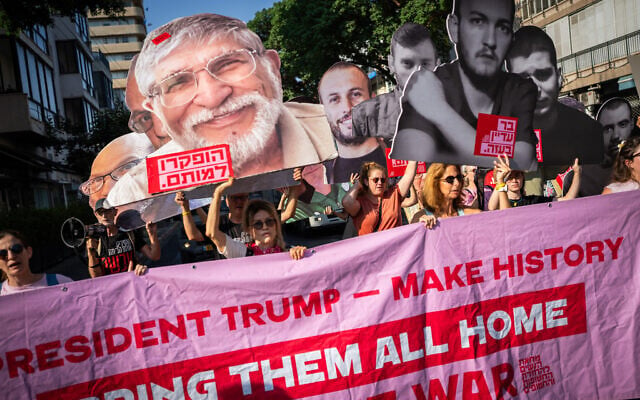
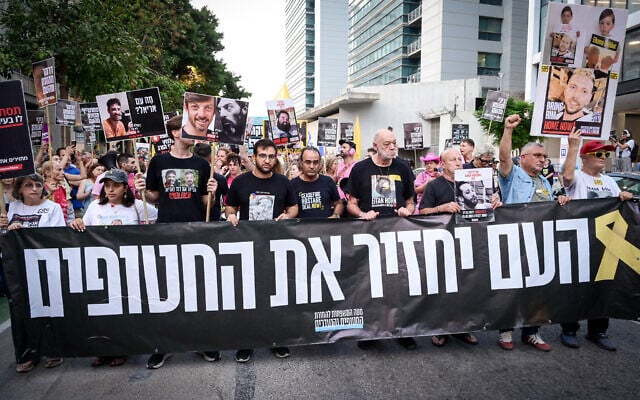
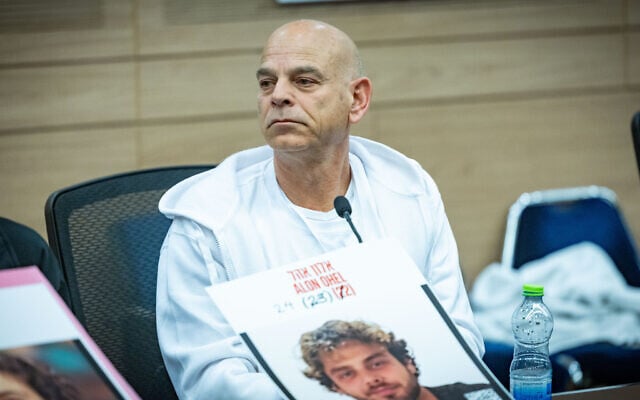

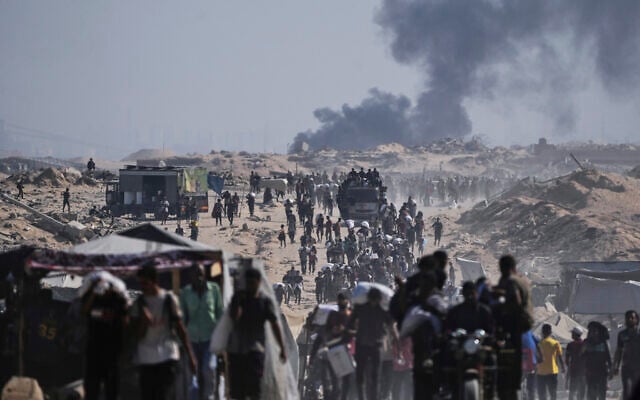




Comments
Post a Comment